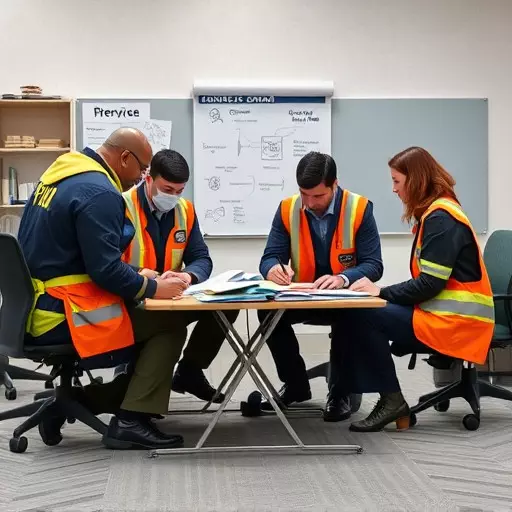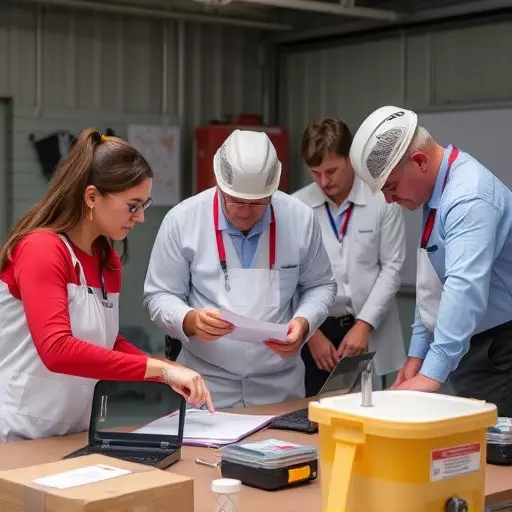PHA facilitation experts and tools are essential for navigating complex process hazard analysis (PHA) compliance requirements. These specialists leverage advanced tools and hazard identification techniques to go beyond basic inspections, thoroughly analyzing equipment interactions and potential failure modes. By fostering a culture of proactive safety management, they empower organizations to make informed decisions, meet industry standards, and comply with regulations while enhancing operational safety and driving continuous improvement.
“In today’s stringent industrial landscape, understanding and adhering to PHA (Process Hazard Analysis) compliance requirements is vital. This comprehensive guide navigates the essential aspects of PHA, offering a detailed overview for professionals. From the foundational role of PHA facilitation experts in ensuring safety to advanced hazard identification techniques, we explore effective strategies. We delve into crucial pha facilitation tools for streamlined processes and provide insights on meeting regulatory expectations. Additionally, best practices for continuous improvement are highlighted, ensuring your organization stays ahead in risk management.”
- Understanding PHA Compliance Requirements: An Overview
- The Role of PHA Facilitation Experts in Ensuring Safety
- Unlocking Effective Hazard Identification Techniques
- Essential PHA Facilitation Tools for Streamlined Processes
- Navigating Regulatory Expectations for PHA Compliance
- Best Practices for Maintaining Continuous Improvement
Understanding PHA Compliance Requirements: An Overview
Understanding PHA Compliance Requirements involves grasping the essence of Process Hazard Analysis (PHA), a systematic approach to identify and mitigate risks within industrial processes. PHA compliance is crucial, especially for facilities managing complex operations, as it ensures the safety and reliability of their processes. By employing pha facilitation experts and utilizing specialized pha facilitation tools, organizations can navigate through hazard identification techniques that go beyond mere inspection.
These techniques delve into a comprehensive analysis of process steps, equipment interactions, and potential failure modes, providing insights that drive informed decision-making. This proactive approach not only enhances operational safety but also fosters a culture of continuous improvement, where risks are consistently evaluated and mitigated, ensuring compliance with industry standards and regulatory requirements.
The Role of PHA Facilitation Experts in Ensuring Safety
PHA facilitation experts play a pivotal role in ensuring safety within organizations by guiding them through the complex process of Hazard Identification Techniques (HITs). These professionals possess specialized knowledge and utilize advanced pha facilitation tools to navigate potential risks effectively. Their expertise lies in helping companies identify, assess, and mitigate hazards across various sectors, thereby fostering a culture of proactive safety management.
Through tailored training sessions and workshops, PHA experts empower employees to actively participate in HITs, ensuring comprehensive risk evaluation. By employing evidence-based methods, they facilitate discussions that uncover hidden dangers, promote critical thinking, and drive continuous improvement in safety protocols. This collaborative approach not only enhances overall workplace safety but also enables organizations to meet stringent regulatory requirements with confidence.
Unlocking Effective Hazard Identification Techniques
Unlocking Effective Hazard Identification Techniques involves leveraging specialized knowledge from PHA facilitation experts and utilizing proven Pha facilitation tools. These professionals are trained to guide organizations through a structured process, ensuring every potential hazard is thoroughly evaluated. By employing advanced methods, companies can identify risks that may be hidden or overlooked, enabling them to implement robust risk mitigation strategies.
The right Pha facilitation tools provide a systematic approach to hazard identification. These tools offer customizable frameworks and templates that simplify the complex task of risk assessment. They facilitate comprehensive analysis by breaking down processes into manageable components, allowing for a deep understanding of operational risks. With these techniques in place, organizations can make informed decisions, enhancing their overall compliance and safety measures.
Essential PHA Facilitation Tools for Streamlined Processes
In the realm of PHA (Process Hazard Analysis) compliance, effective facilitation is key to streamlined processes. PHA facilitation experts leverage specialized tools and techniques for hazard identification that go beyond traditional methods. These experts employ advanced software solutions designed to map out complex processes, identify potential hazards, and assess their severity, all while providing a comprehensive view of the entire system.
By utilizing these pha facilitation tools, organizations can significantly enhance their risk management capabilities. The process becomes more efficient, allowing for faster identification and mitigation of risks. This, in turn, ensures that facilities meet regulatory requirements and maintain a robust safety culture. Moreover, these tools facilitate effective communication among stakeholders, fostering a collaborative environment that is essential for successful PHA implementation.
Navigating Regulatory Expectations for PHA Compliance
Navigating Regulatory Expectations for PHA Compliance is a critical aspect of ensuring safety and environmental stewardship in any industrial or commercial setting. The Process Hazard Analysis (PHA) is a robust framework that helps organizations identify, assess, and mitigate potential hazards associated with their processes. pha facilitation experts emphasize the importance of using well-established hazard identification techniques to uncover even the most subtle risks. They also advocate for pha facilitation tools that streamline the analysis process, making it more efficient and effective.
Compliance with regulatory expectations involves staying abreast of evolving standards and guidelines set by governing bodies. By engaging pha facilitation experts, organizations can ensure their PHAs are conducted systematically and comprehensively. These professionals provide valuable insights into best practices and help implement robust risk management strategies. This proactive approach not only satisfies regulatory requirements but also fosters a culture of safety within the organization.
Best Practices for Maintaining Continuous Improvement
Maintaining continuous improvement is a key aspect of PHA compliance and ensures that your facility remains safe and efficient. Regularly reviewing and updating hazard identification processes using effective techniques, such as those employed by pha facilitation experts, is essential. These professionals provide valuable insights and tools to identify even the most subtle risks, ensuring no stone is left unturned in your risk assessment process.
Implementing a robust system for documenting and tracking identified hazards allows for better monitoring and management. By utilizing specialized pha facilitation tools, you can streamline this process, making it more accessible and efficient. This approach fosters a culture of safety where every employee is encouraged to actively participate in identifying and mitigating potential risks, contributing to a positive work environment and continuous enhancement.


